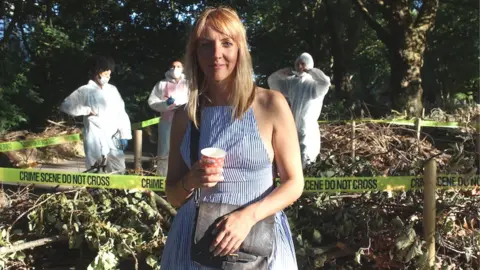Ebooks: How digital publishers are 'shaking up' the industry
 BBC
BBCJK Rowling notoriously received numerous rejections before meeting her literary agent, and later, publisher. Having stacked up at least 60 rejections in my writing career, I know exactly how that feels.
And while being a novelist recently came out on top in a survey as one of the most desirable jobs to have, it is definitely not for the faint hearted.
I now have an agent and an award, but it wasn't always that way.
As a writer, the first step to securing a publishing deal is to acquire an agent, a middle-man, basically your number one fan who will shout about how good you are to publishers and hopefully persuade them to read your carefully-crafted novel.
They are the gatekeepers to the publishing industry.
Digital publishers, however, are changing the game because they talk directly to authors.
This doesn't mean that manuscripts are of a lesser quality. It just means there are new ways of doing things.
We live in a truly digital era, yet the digital publishing industry is still largely misunderstood.
Digital publishers are often young, dynamic companies striving to find creative ways to win influence in the online retail market of fiction and non-fiction.
They also compete with traditional print publishers to discover the next big idea.
 Getty Images
Getty ImagesBeing an avid Kindle reader, I was excited when I received the email from my agent explaining that a leading digital publisher wanted to take on my debut psychological thriller, I Never Lie.
The editor and sales director fell in love with my protagonist instantly and hoped I would sign with them, this after the book didn't manage to find a home with traditional print houses. I had a mixed reaction to the offer.
First, there was a huge relief, finally someone believed in my writing enough to invest and publish it. But then came the questions from friends and colleagues: "Who's the publisher?"
The next question was: "What's the advance?" When I responded with, "There isn't an advance," they reacted to my news with a muted excitability.
I explained it was an ebook deal, and they looked at me with some perplexity. They also asked if it was self-publishing, and I explained that it was far from self-publishing, having gone down that route in the past.
But it was as if I hadn't arrived in the world of publishing by securing a digital deal, which is ironic given how digital our lives have become.
Digital publishers don't deal in advances. They deal in metadata and higher royalties. My publisher Canelo saw a gap in the market for high-quality ebooks where no digital edition was available and did quite well out of it, they are now investing in original high-quality commercial fiction.
And, while this business model might not be good for bookshops, for authors it's pretty sweet - if the book sells. They offer up to 40% more royalties than traditional print houses.
Okay, so your book won't be on the bookshelf in WHSmith, but as a first-time author, who cares?
 Getty Images
Getty ImagesI wondered how on earth they would go about marketing the book given the snobbery I'd experienced in announcing I was going digital, but to my surprise my book logged position 140th in the overall Kindle charts two weeks after release date. It now has close to 100 reviews on Amazon.
Working with a digital publisher I received the same support that any unpublished writer working with a print house would, especially in the area of marketing, which is the key difference between self-publishing and working with a team of dedicated professionals.
I also get to set some of the rules. They sent me a questionnaire asking me what I expected. This can range from being in the top 10 to being recognised by other authors, and whether I wanted to make money or just sell it.
The two are not the same thing apparently. If I'd said "make money" they would have set the price higher. As it was, my agent advised me to just get it out there so they priced it down because statistically most readers pick up a book by an unknown author if the book is priced low. It's the take-a-punt market.
There are ways of measuring whether readers finish books too, interestingly. The PigeonHole for one, is an app that serialises books in staves. They release staves over a period of 10 days.
Each stave is timed in terms of reading time. My book was released in staves that timed at 24 minutes.
It means readers can plan to read a book on their commute or factor it into their day. The Pigeonhole said that at least 74% of those who signed up to read my book finished it.
That's an incredibly powerful thing to know in the take-a-punt market. If readers are finishing the book, hopefully it generates reviews, which generates more interest and more sales.
In my case, it was a unique experience being on an app with readers. I would wake up to text alerts every day with all kinds of theories spinning around because readers can highlight text and comment live.
Libraries have also cottoned on to the digital readership and have developed apps where you can take out digital books. Readers say it can save on late fees because there's no book to return.
As there was no physical book, I got creative for the book launch by recreating the crime scene from the opening chapters on London Fields. There was a forensics team. I baked a cake with my book cover on it.
Passers-by wondered what on earth was going on so we handed out postcards of the cover including promo codes where they could go online and download the book for free, again to generate more interest. It made it into the local Hackney press. It was a book launch with a difference. It included performance art.
I had little or no knowledge of the digital publishing industry before my book deal and it is still an uphill struggle for traditional print media to take ebooks seriously, but I have since come across many online platforms that have a dedicated online reading community.
It's a curious new world and one that is presenting authors with new ways of working in the publishing industry.
Of course, I still dream of one day seeing my book in WHSmith, but for now I'm a happy writer. My book is now an object out there in the world and once that happens, the possibilities are endless.

Digital publishing: Five key tips
 Getty Images
Getty Images1. Do your research on the digital publisher. What are they looking for? Non-fiction? Fiction? Genre-fiction? Then read their submission guidelines and follow them closely.
2. Follow digital publishers who may be interested in your work on social media. They often put a call out for certain genres and hold open submissions. Plus you can always ask them for advice in this way. They do respond.
3. If you're dealing directly with a publisher make sure you employ a freelance editor to go over your manuscript. An agent will typically do this, so you need that second opinion on whether the manuscript is ready or not.
4. Work with them on the marketing. Maybe you you can get your book mentioned in your local newspaper? It's a start.
5. Get excited about the fact that you can now talk to publishers, but be realistic and don't give up your day job just yet.

Follow us on Facebook, on Twitter @BBCNewsEnts, or on Instagram at bbcnewsents. If you have a story suggestion email [email protected].
